Despite initial concerns, Chat GPT has not replaced search. Q2 record earnings show Google Search does better than ever. That’s why OpenAI’s new search engine, Search GPT, makes only sense after a second look.
Boost your skills with Growth Memo’s weekly expert insights. Subscribe for free!
$5b USD
Why would OpenAI launch a search engine if its main product poses one of the biggest threats to Google?
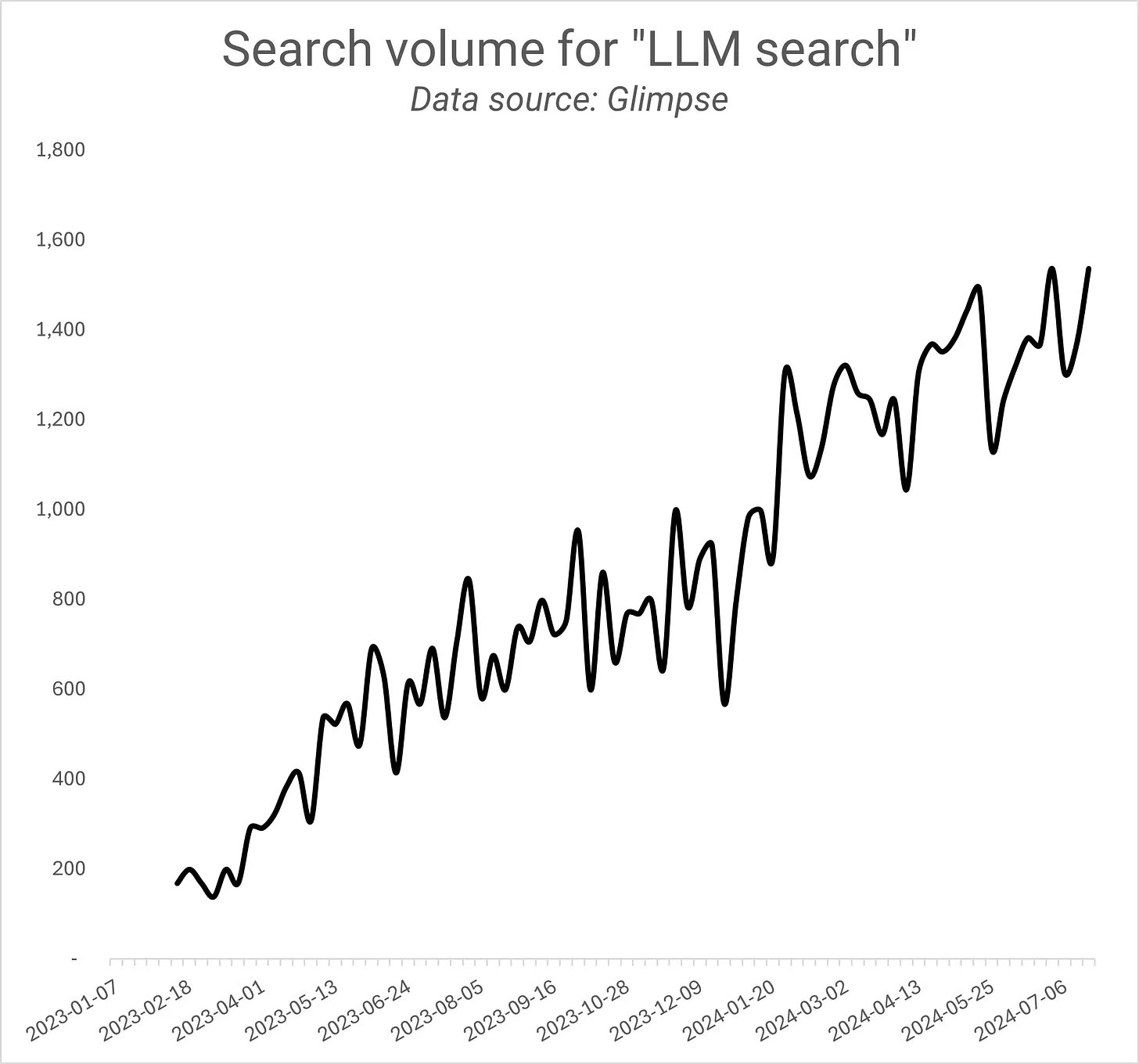 Image Credit: Kevin Indig
Image Credit: Kevin IndigSearches for “LLM Search” are growing, but it’s not consumer demand that pulls OpenAI in that direction. There are six good reasons (in order of importance):
1/ OpenAI’s problem is that Chat GPT is not perceived as a search engine despite similar capabilities, so the company positions Search GPT as a direct Google alternative to gain more Search market share.
Rumors about launching a search engine just before Google I/O in 2024 and the impact of the actual announcement on Alphabet’s stock show the ambition to compete directly.
The Information reports that OpenAI loses $5b a year in expenses.1 Just capturing 3% of Google’s $175b Search business would allow OpenAI to recoup expenses.
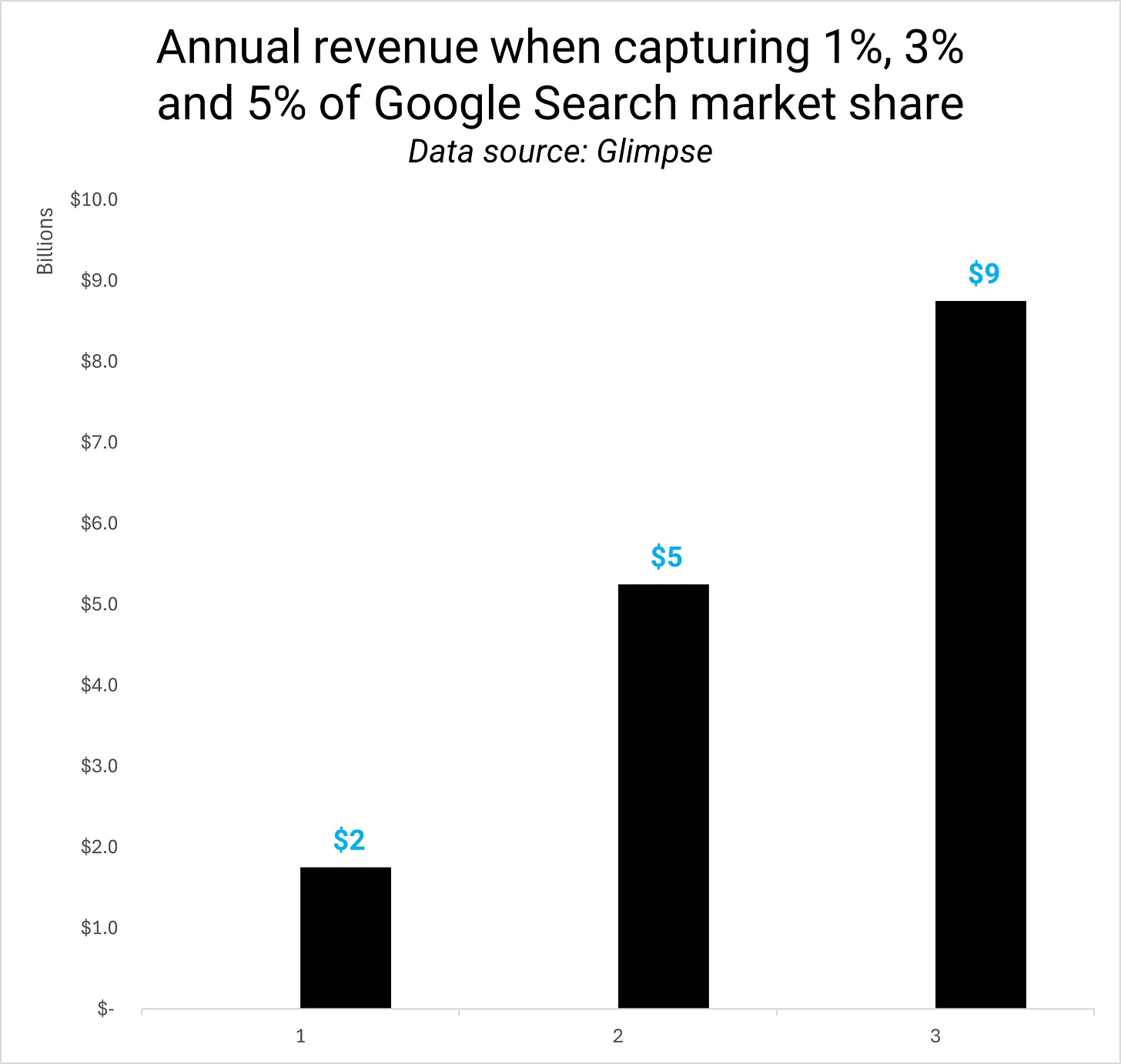 Image Credit: Kevin Indig
Image Credit: Kevin IndigSearches for ChatGPT on Google are growing so much, they get close to searches for “Google”. They’ve already surpassed searches for other search engines by a lot.
To be fair, people search less for “Google” on Google (maybe in their browser bar to get to the Google homepage), and traffic numbers between Google (465b, according to Similarweb) and Chat GPT (660M) are still magnitudes apart.
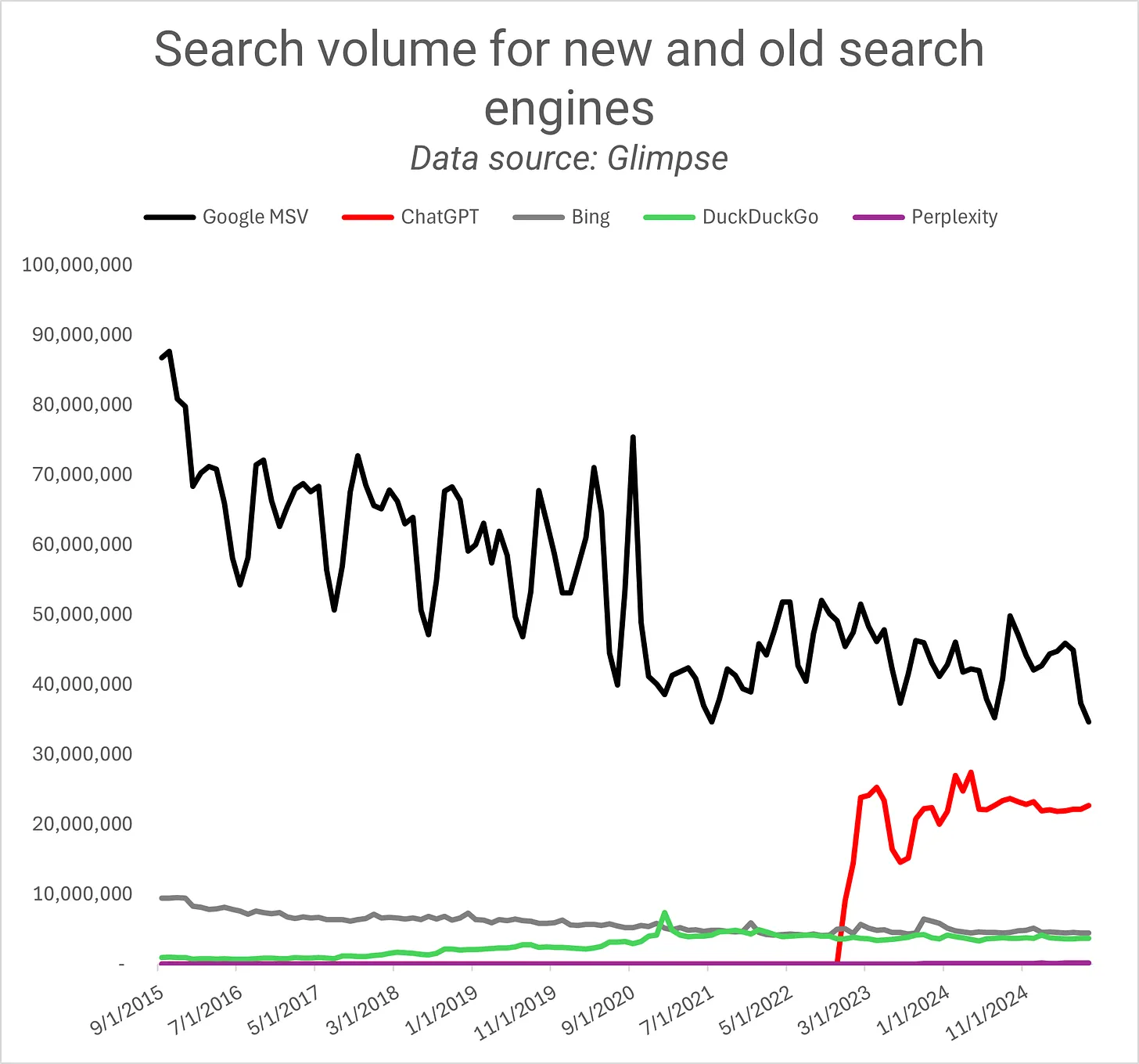 Image Credit: Kevin Indig
Image Credit: Kevin IndigOpenAI has a strategic advantage over Google: Search GPT can provide a very different, maybe less noisy, user experience than Google because it’s not reliant on ad revenue. In any decision regarding Search, Google needs to take ads into account.
2/ OpenAI crawls the web for training data and already has half the ingredients for a search engine on the table. Consumers are already familiar with the concept of a search engine, making adoption more likely.
I have no doubt that OpenAI will see a lot of curious sign-ups for Search GPT but the bigger challenge will be retaining users.
It’s also important to point out that the market hasn’t found the final form of LLMs yet. Chatbots made sense because of their prompting nature, but voice devices will likely become much better devices for LLMs.
3/ Search can deliver better user signals than prompting because it’s a more specific use case.
The beauty of prompting is that it’s an open field. You can do whatever you want. But that’s also a disadvantage because most people have no idea what they want to do and where to start.
As a result, success and failure are harder to measure at scale for chatbots than search engines.
A search engine, despite being versatile, has clearer use cases, which could drive more adoption and deliver better signals for LLMs to learn. In return, those learnings could transfer to chatbot answers, which are a big part of Search GPT.
4/ OpenAI wants to throw publishers a lifeline to secure a content pipeline. LLM developers need fresh content to train models and serve timely answers.
Search is the biggest source of publisher traffic2, but publishers are growing more frustrated with Google due to Algorithm updates, site reputation abuse penalties and AI Overviews.
It’s good timing for OpenAI to offer another source of revenue and get publishers “on their side”, especially after OpenAI itself has received a lot of criticism from publishers and a lawsuit from the NY Times.
The launch of SearchGPT follows a long list of publisher licensing deals:
- News Corp (+$250 million over five years): WSJ, New York Post, The Times, The Sun
- Associated Press (AP)
- Axel Springer: Bild, Politico, Business Insider
- Financial Times
- Le Monde
- Reuters
- Prisa Media
- Dotdash Meredith
- Time magazine
- Vox media
- Wiley (one-time fee of $23 million for previously published academic articles and books)
But even the best deals don’t help if publishers cannot sustain the creation of fresh content. If Search GPT can become a new traffic and revenue source for publishers, it would be a way to keep the critical ecosystem alive and get on the good side of publishers.
5/ Perplexity is a small challenger to OpenAI, but even a small challenger can take away mind share, and you never want to underestimate the competition. A search engine would conveniently fence in their growth. Why use Perplexity when Search GPT, which looks very similar, can do the same thing?
6/ OpenAI might bet on regulators breaking up Google’s exclusive search engine deal with Apple and hope to become part of a search engine choice set on Apple devices.
Granted, we’re talking about a very small chance, and certainly not the decisive factor for building a search engine, but it could be a small factor nonetheless.
Publisher GPT
Search GPT is clearly the sibling of Chat GPT. Besides SERP Features like weather charts and table stakes features like auto-suggest, the experience feels like Chat GPT.
The differences are hard to spot at first but meaningful in their potential to drive revenue, compete with Google and strengthen OpenAI’s data mining.
But one change stands out: Search GPT has more pronounced links to web results, a clear hat tip to publishers.
The Search GPT landing page mentions the word publisher 14 times and underlines how important publishers are for the open web and how dedicated OpenAI is to working with them.
OpenAI uses a different user agent to crawl websites for its search engine than for LLM training and strongly separates the two.
Importantly, SearchGPT is about search and is separate from training OpenAI’s generative AI foundation models. Sites can be surfaced in search results even if they opt out of generative AI training.
It’s not an accident that OpenAI tries to regain its grip on the web. A recently published study3 found that 25% of words (tokens) in Common Crawl stem from domains that have now excluded AI crawlers, with OpenAI at the top of the list, in their robots.txt or ToS.
SEO Implications
The two questions every SEO is asking themselves is whether they should care about Search GPT and how it might work.
Search GPT has a chance to become relevant for SEO quickly, given Chat GPT’s adoption. The Apple Intelligence integration and a potential phone would spur adoption even more.
However, OpenAI might integrate Search GPT into Chat GPT, which could change the relevance as a traffic source.
We cannot yet know how Search GPT works because it’s not live, but one big differentiator will be whether Search GPT includes results from the broad web or only from publishers OpenAI made a deal with.
If it’s the broad web, Search GPT has a high chance of being relevant. If it’s limited to partnering publishers, SEO won’t make sense for anyone not a partner because the answer set is limited.
If Search GPT uses RAG and ranks results similar to Google’s AI Overviews, we could use AIO performance as indicator and predictor for SearchGPT performance.
There is also chance that an answer from Chat GPT for queries that don’t require QDF (query deserves freshness) is the same on Search GPT, which would give us a way to understand what works before Search GPT launches publicly. Hard to validate without access Search GPT, though.
Search GPT could gain the web’s favor by sending relevant traffic, making it easy for sites to submit content, for example, through XML sitemaps, and providing some sort of webmaster console. As a result, Search GPT would position itself even stronger against Google.
A New Way To Search
If the main benefit or Search GPT for OpenAI is a revenue stream and access to more user data, the next logical step for OpenAI is to build a (AI-powered) browser.
Browser data is incredibly valuable for understanding user behavior, personalization and LLM training. Best of all, it’s app-agnostic, so OpenAI could learn from users even when they use Perplexity or Google.
We’ve seen the power of browser data in the Google lawsuit, where it turned out Google relied on Chrome data all along for ranking. The only layer that’s more powerful is the operating system and device layer.
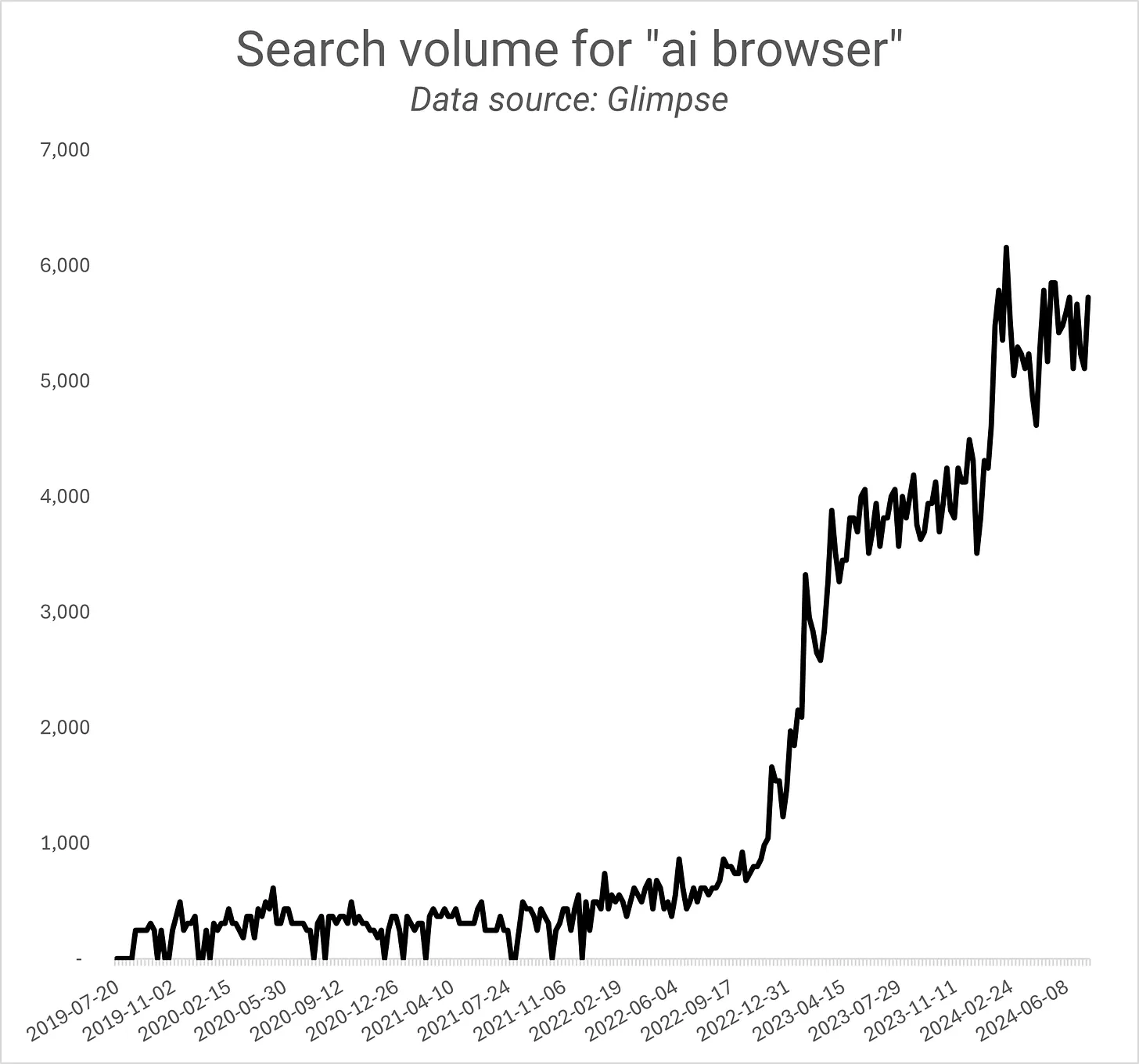 Image Credit: Kevin Indig
Image Credit: Kevin IndigThere is already news that Sam Altman is working with Jon Ivy on building a phone. No wonder since Apple holds immense power over other ecosystems and platforms.
Remember when Apple blew a $10b hole into Meta’s annual revenue? Apple could develop its own models and surface them on the OS level—a critical threat to OpenAI. A browser could alleviate at least some of that threat.
Bing released its own update to Search, giving us an idea of what Search GPT could look like. The new Bing prominently features AI answers at the top and search results on the side. A fitting metaphor for classic blue links.
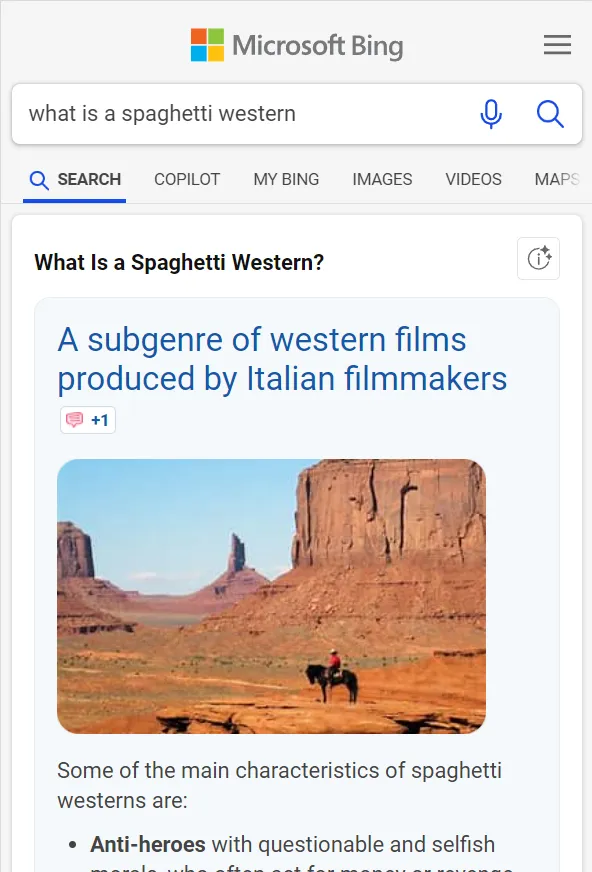 Image Credit: Kevin Indig
Image Credit: Kevin Indig1
Why OpenAI Could Lose $5 Billion This Year
2
Who Sends Traffic on the Web and How Much? New Research from Datos & SparkToro
3





![AI Overviews: We Reverse-Engineered Them So You Don't Have To [+ What You Need To Do Next]](https://www.searchenginejournal.com/wp-content/uploads/2025/04/sidebar1x-455.png)